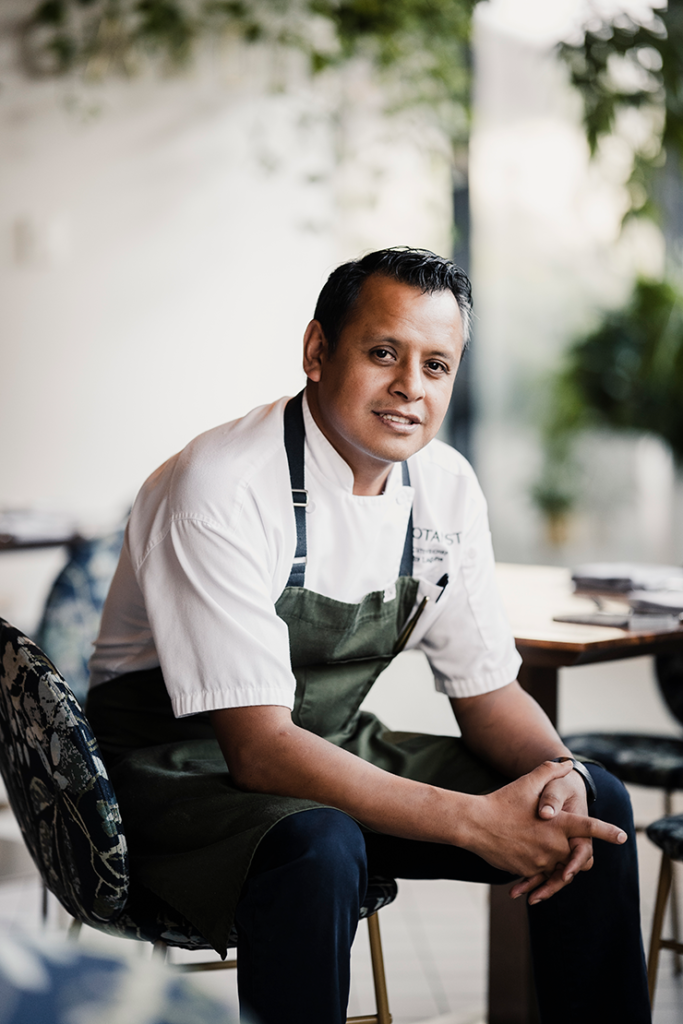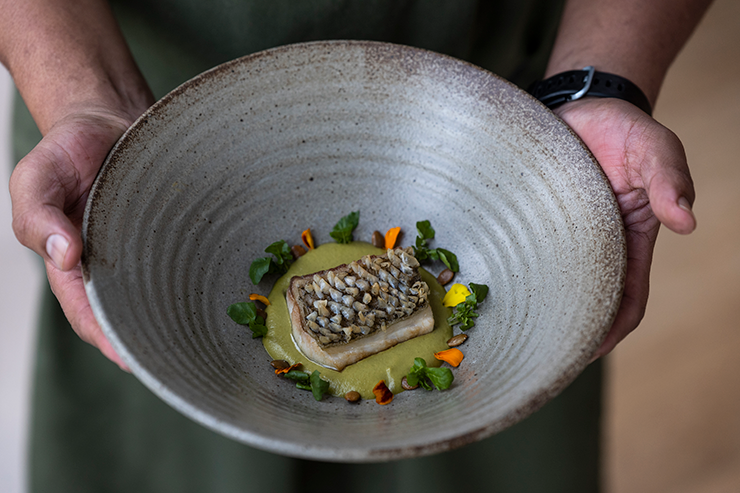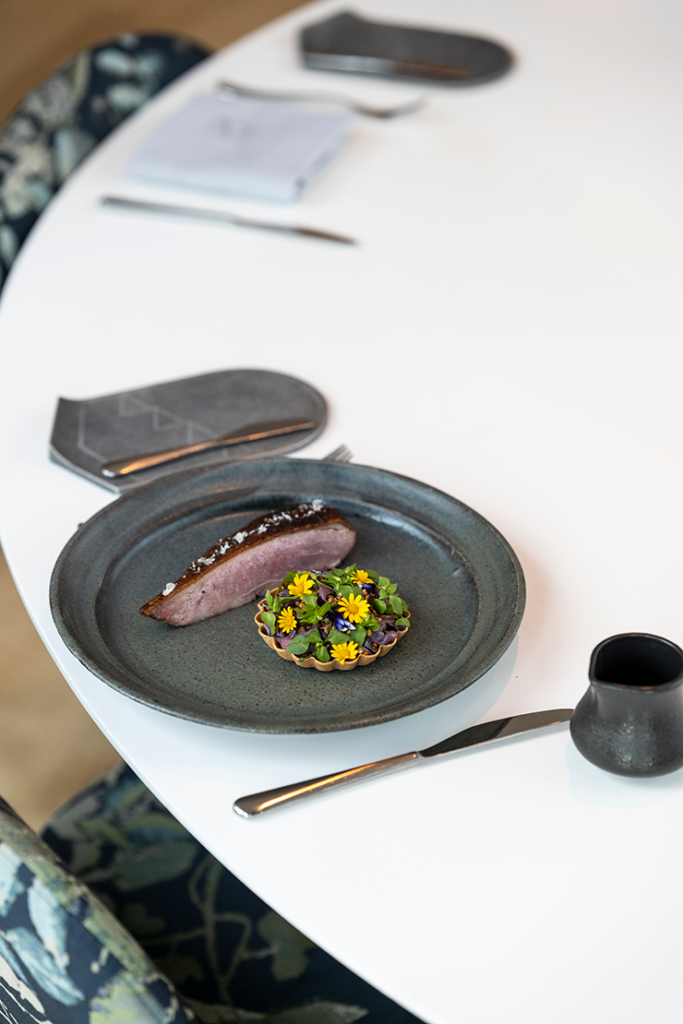Botanist chef Hector Laguna treats local, seasonal food with respect

Words Joanne Peters
Photography Lia Crowe
Growing up in Mexico, Vancouver chef Hector Laguna spent time in Veracruz and Hidalgo, going back and forth between oceanside and farmland.
He could pick wild mangoes, oranges and bananas to snack on, and at his family’s ranch, his father grew everything from corn to coffee beans, and raised chicken and pigs. His parents taught him how to make cheese from the milk of their own cows and how to cook traditional barbacoa lamb in a fire pit covered in agave leaves. He didn’t know it at the time, but those early years living off the land laid the foundation for an extraordinary career in culinary arts.
The executive chef of Botanist at Fairmont Pacific Rim, Hector launched the restaurant when it opened six years ago. Under his leadership, Botanist has been named one of Canada’s 50 Best Restaurants, listed on the World’s 50 Best Discovery list, and ranked a CAA/AAA Four Diamond restaurant. Most recently, the dining spot earned the coveted distinction of being included as a “recommended” restaurant by Michelin in its inaugural Vancouver guide.
Hector’s passion for his work in a professional kitchen goes back to his roots.
“Ninety per cent of the food we ate back home we grew or raised ourselves,” Hector says. “We made everything. I would help my mom make spices for the mole. We were seven kids, and all of us pitched in to grind the corn to make tortillas before we went to school. We had chores on the farm and in the kitchen, and it was the same idea after school.
“We cooked together, and the whole family always ate dinner together,” he says. “We all sat around the table, just talking; we shared everything. I realized that food is a lot more than just food. It brings everybody together. It’s the same thing when you do it for a living: it’s a lot more than just cooking. It makes people’s evening.”

Hector’s path to helming one of the most respected restaurants in Canada was a circuitous one. In high school, he wanted to become a veterinarian. With most training being available in English, he moved to San Francisco to improve his second language. To support himself, he took a friend up on an offer to help out in a Vietnamese restaurant. He loved every aspect of it, working his way up from washing dishes to making salads to eventually running the kitchen. He stayed for five years.
Hector met his wife at that restaurant—she was working there as a host. Through her postgraduate studies, the two moved to Florida, where Hector landed the kind of once-in-a-lifetime job—working for James Beard Award-winning chef Michelle Bernstein—that becomes a life-changing event.
“Thanks to her, I became a chef,” Hector says. “I understood food on a different level because of the way she sees food and talks about food. I saw the passion and the dedication. The kitchen was so tiny, but customers would say things like, ‘This was the best meal I’ve ever had.’ And I could see the impact that had on them. The more I did it, the more I liked it.”
Hector absorbed as much culinary knowledge as possible. During the 40-minute bus ride to and from work, he’d read cookbooks by the likes of legendary American chef Charlie Palmer and establishments such as The French Laundry.
With his wife, Hector later moved to Toronto, working for acclaimed chef Susur Lee, before heading to Vancouver, where he accepted a position at Hawksworth, once again rising through the ranks.
When the opportunity to helm Botanist came about, Hector didn’t hesitate. He felt that the vision for the restaurant aligned with the culinary philosophy he grew up with: to use the best local, seasonal ingredients you can find and let them shine.
“With the local ingredients we source here, we can be very vegetable-forward with a lot of high-quality protein,” Hector says. “We come up with dishes by always looking at what the farms around here have.”
To get a sense of just how committed Laguna is to local producers, consider that he recently took the entire Botanist team—both back- and front-of-house staff members—on a field trip to one of his favourite organic farms. He wanted them to see where their ingredients came from and understand all that goes into any particular dish.
“We don’t reinvent the wheel,” Hector says. “If I have a beet, I make sure I cook it the best way; I don’t overcook it or undercook it. We cook steak the best way we can. I’ve never used a sous-vide machine. We get our ducks from the Fraser Valley. We treat food with respect. That’s what it comes down to.”
While the Botanist menu is not Mexican, Hector has proudly introduced a dish of barbacoa lamb that harkens back to the celebratory meals he enjoyed with his family back home. He can’t cook it in an underground hole over hot stones overnight like he did in Mexico, of course, but he has recreated the meat’s depth of flavours through a slow cooking process that involves banana leaves and a whole lot of tender loving care.
“I had a guest who lives half an hour away from where I lived in Mexico, in Tulancingo,” Hector says. “He said, ‘This tastes like home for me.’”
As Botanist continues to gain accolades, it has recently introduced a series of quarterly collaborative events with top restaurants and bars from all over the world. The evening events aim to provide unrivalled immersive culinary experiences for local guests. Past partners have included New York City’s SAGA and Katana Kitten. Mexico City’s Hanky Panky Cocktail Bar, ranked 13 on the World’s 50 Best Bars list, joined forces with Botanist for a celebration of Día de los Muertos.
Hector sees these international collaborations as a way to thank loyal Botanist diners.
“It’s a way of showing our guests that we care about them,” he says. “We want to offer them something unique, new dishes and experiences.”
When Hector isn’t at work, he’s with his wife and two children, aged seven and four. He coaches their soccer teams and takes them to school every day. They listen to music, sing, dance, read and play games together. And they cook.
“Mondays are our cultural day,” Hector says. “We pick a different country and we’ll read about it, play music, and cook different foods from those places. We have no phones on and no TV. It’s a way to have quality time together.”


 The culinary kingdom of Whistler
The culinary kingdom of Whistler